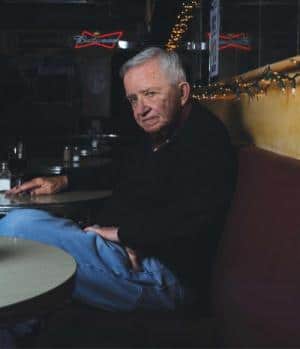Author Dan Wakefield Recalls Friend James Baldwin Ahead Of Indy Film Screening

When I read James Baldwin’s book of essays Notes of a Native Son, I got a chill at this passage in his Autobiographical Notes: “I have many responsibilities, but none greater than this: to last, as Hemingway says, and get my work done.” I knew he was “a real writer,” and I was thrilled to meet him and get to know him when we both lived in Greenwich Village in the 1950s.
What I remember most were his eyes—those large brown eyes that seemed to see right through you, right into your mind, and to know at once if you were speaking the truth. He spoke and wrote the truth himself, and expected nothing less from others. You knew it when you read any sentence of his, whether it was from a story, an essay, or a novel. He was a Negro—that was the term for blacks, for African-Americans, in those days—but he was not defined as a writer by his race, nor limited in his understanding, which was universal. He liked to drink and talk and laugh, and his face could crack open into a roar of explosive joy.
People now imagine that writers who lived in The Village in those days were all “Beats,” but in fact that was only a small faction, and did not include me, or writers I admired like James Baldwin. He scoffed at the poses and pretensions of the Beats, and called Kerouac and Ginsberg “The Suzuki rhythm boys,” referring to their talk of Zen Buddhism (D.T. Suzuki’s Introduction to Zen was a hot book at the time). Baldwin thought Kerouac romanticized blacks, and referring to a passage on Harlem in a Kerouac novel, Baldwin told me, with raised eyebrows, “He had better not read that from the stage of The Apollo” (the main theater in Harlem).
He spoke and marched with Dr. Martin Luther King, and he was one of the most powerful speakers I have ever heard, but his lasting contribution to this country and the world was in his books: novels like Go Tell It on The Mountain, Giovanni’s Room, Another Country, essays that included Notes of a Native Son, Nobody Knows My Name, and The Fire Next Time.
Get details and tickets for the Uncle Dan’s Movie Time presentation of the James Baldwin documentary I Am Not Your Negro on February 22. Wakefield will share stories of his friendship with Baldwin in New York in the 1950s. Q&A to follow film.
Wakefield’s memoir New York in the Fifties is now an e-book.





